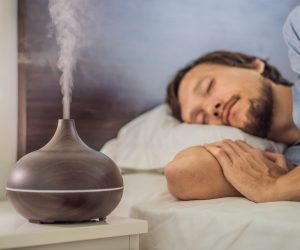Table of Contents
Does a Humidifier Help With Phlegm?
 Yes, using a humidifier can help reduce phlegm and relieve coughing caused by dry air.
Yes, using a humidifier can help reduce phlegm and relieve coughing caused by dry air.
Dry winter air allows less moisture into the nasal passages and throat, causing mucus membranes to dry out. The body reacts by overproducing mucus to compensate for the lack of moisture. Thicker, stickier phlegm builds up and is harder to clear from the airways, leading to coughing as the body tries to expel the excess phlegm.
By adding moisture back into the air, humidifiers can thin out mucus secretions and make them easier to cough up and eliminate.
According to the EPA, ideal indoor humidity levels during colder months should be between 30-50%. Using a humidifier is one of the most effective ways to increase moisture in the air when indoor environments become excessively dry.
 |
Top Pick For “Over-All” Best Humidifier Levoit LV 6000S View On Amazon |
How Does Dry Air Cause Phlegm Buildup?
In order to understand how a humidifier can help with phlegm, it helps to first look at how dry air leads to excess mucus production and coughing in the first place:
- Dry air allows less moisture into the nasal passages and throat, causing mucus membranes to dry out.
- The body reacts by overproducing mucus to compensate for the lack of moisture.
- Thick, sticky phlegm builds up and is harder to clear from the airways.
- Coughing is the body’s attempt to expel and clear the excess phlegm.
During colder months when indoor heating systems are running frequently, the air becomes exceptionally dry. This leads to dried out, irritated airways and increased phlegm production. Using a humidifier helps reverse these issues by adding moisture back into the air.
How Can a Humidifier Help?
There are several key ways that humidifiers can provide relief when you’re dealing with excess phlegm and coughing:
- Thins out mucus secretions – The added moisture from a humidifier helps thin out mucus in the nasal passages, throat, and lungs. Thinner phlegm is much easier to cough up and eliminate.
- Relieves coughing – By thinning out phlegm and keeping airways lubricated, a humidifier can provide relief from persistent coughing caused by thickened mucus.
- Soothes irritated airways – The moist air from a humidifier hydrates and soothes respiratory tracts irritated by dryness. This calms coughs and eases discomfort.
- Loosens congestion – The hydration provided by a humidifier also helps loosen mucus plugs and congestion in the nose and chest, promoting drainage.
Other Ways Humidifiers Help With Phlegm:
| Benefit | Explanation |
|---|---|
| Hydrates nasal passages and throat | Moisture prevents dry, cracked membranes that trigger excess mucus production. |
| May clear sinuses | Added moisture can help loosen and drain sinus congestion. |
| Alleviates cold & flu symptoms | Humidified air soothes cough, congestion, and sore throats from respiratory illnesses. |
| Relieves allergies & asthma | Hydration helps minimize allergy triggers and asthma attacks. |
| Aids chronic conditions | COPD, cystic fibrosis, and other conditions involve excess phlegm. Humidifiers provide hydration and thinning of secretions. |
What Type of Humidifier Is Best?
The type of humidifier you choose can make a difference in how effectively it thins mucus and relieves coughing and congestion:
- Cool mist humidifiers are typically best for phlegm reduction. They provide hydration without raising room temperature. This makes them ideal for use in bedrooms and throughout flu season.
- Warm mist humidifiers can also provide relief by loosening sinus and chest congestion through moist, warm mist. Just be aware they may raise room temperatures.
- Ultrasonic and impeller humidifiers that disperse either cool or warm mist over large areas are ideal for providing moisture through multiple rooms.
- Look for humidifiers with tanks over 1 gallon to allow extended runtimes before needing refills.
 Tips for Using a Humidifier to Relieve Phlegm
Tips for Using a Humidifier to Relieve Phlegm
Follow these tips to use your humidifier most effectively for minimizing coughing and congestion:
- Place near your bed – Run your humidifier in the bedroom overnight to maximize relief when coughing and congestion tend to worsen.
- Clean and refill daily – Change water and clean the tank daily to inhibit mold, bacteria, and mineral deposits that can circulate in the mist.
- Use distilled water – To prevent white dust from mineral deposits, use only distilled or purified water.
- Run continuously – For optimal moisture levels, run your humidifier continuously rather than intermittently.
- Monitor humidity – Use a hygrometer to keep humidity around 30-50%. Too much moisture can encourage mold growth.
- Use alongside other remedies – Use a humidifier along with cough medicine, decongestants, etc. for comprehensive relief.
- See your doctor if symptoms persist – Consult your doctor if phlegm and coughing lasts more than 10 days.
The Bottom Line
Using a humidifier can be an effective way to thin out mucus secretions, relieve coughing, and aid in clearing phlegm from the airways. The added moisture soothes respiratory irritation and hydrates the nasal passages and throat. Combining a humidifier with other remedies provides comprehensive relief for phlegm and coughing caused by dry indoor air.
Look for a cool mist or ultrasonic humidifier with at least a 1 gallon tank to provide extended relief throughout multiple rooms. Place it in the bedroom overnight and be diligent about daily cleaning and refilling. Monitor humidity levels to keep them ideal without allowing excessive moisture. Used properly, a humidifier can be a simple way to minimize frustrating phlegm issues when indoor heating dries out the air.
Here is a 7 question FAQ in HTML formatting:
FAQ
1. Why does dry air cause more phlegm and coughing?
Dry air allows less moisture into the nasal passages and throat, causing the mucus membranes to dry out. This triggers the body to overproduce mucus to compensate for the lack of moisture.
2. What’s the ideal humidity level for minimizing phlegm?
The ideal indoor humidity range during colder months is 30-50%. Using a humidifier helps maintain these optimal moisture levels.
3. Are warm mist or cool mist humidifiers better?
Cool mist humidifiers are typically best since they provide moisture without raising temperatures. But warm mist can also provide relief by loosening congestion.
4. How often should you clean a humidifier?
It’s important to clean and refill a humidifier’s tank daily to prevent buildup of mold, bacteria, and mineral deposits in the moisture that’s dispersed.
5. Can using a humidifier too much encourage mold growth?
Yes, excessive humidity over 50% can lead to condensation and mold growth. Use a hygrometer to monitor humidity and keep levels below 50%.
6. What size humidifier is best?
Look for humidifiers with tanks over 1 gallon to allow for extended runtimes before needing a refill. Models with large tank capacities are ideal for providing moisture through multiple rooms.
7. Can humidifiers help with snoring or sleep apnea?
Yes, by keeping nasal passages and throat tissues moist, humidifiers can help reduce snoring and ease some mild sleep apnea symptoms. But they aren’t a cure for moderate to severe sleep apnea.


 Tips for Using a Humidifier to Relieve Phlegm
Tips for Using a Humidifier to Relieve Phlegm